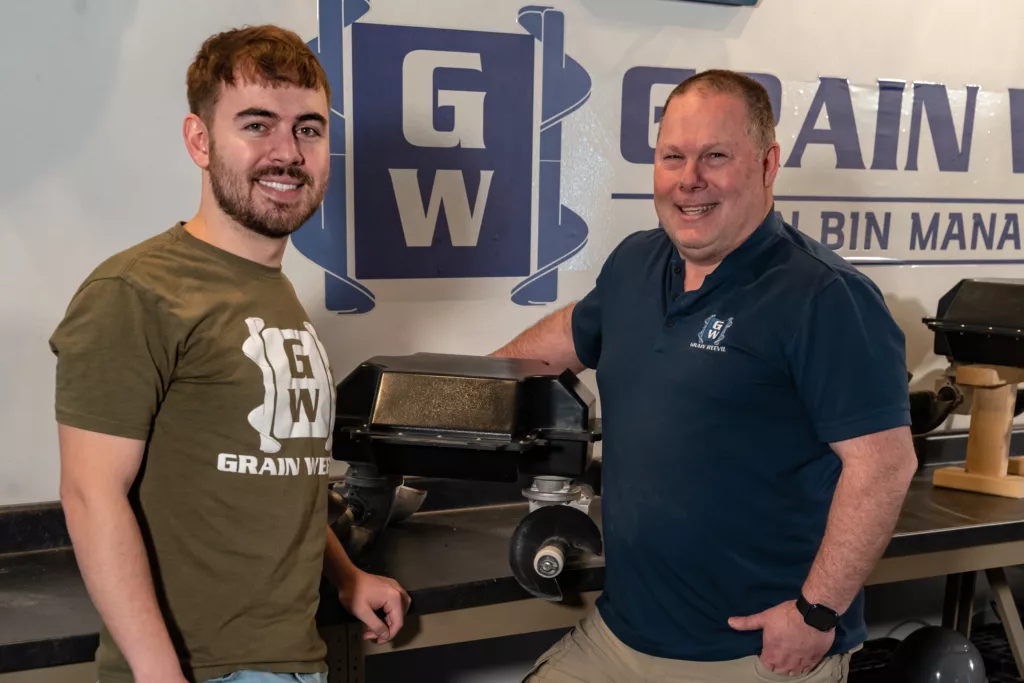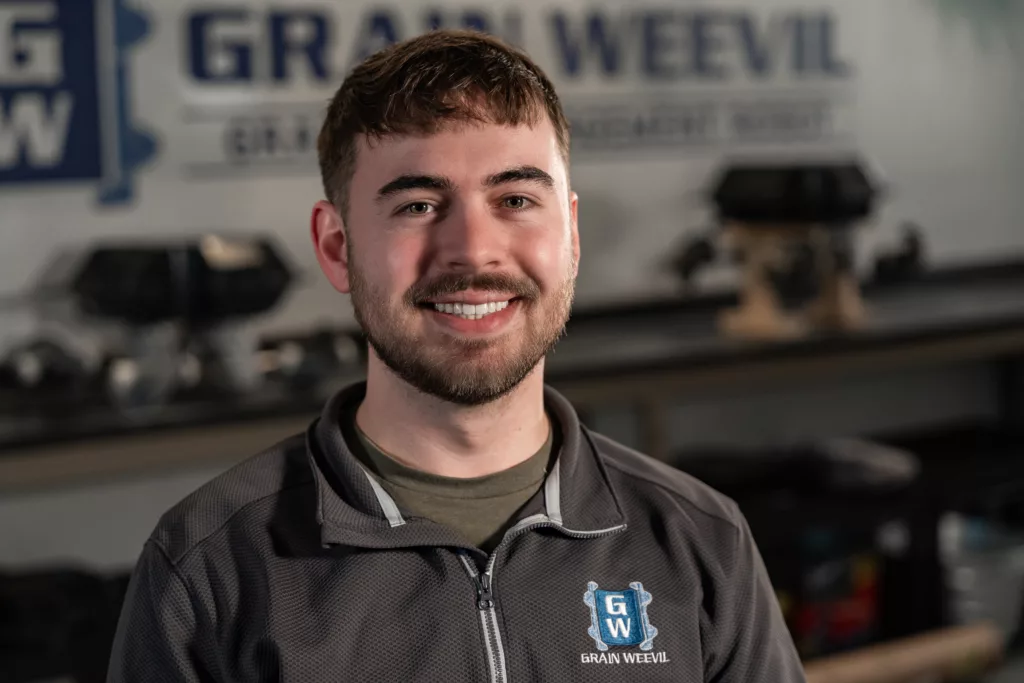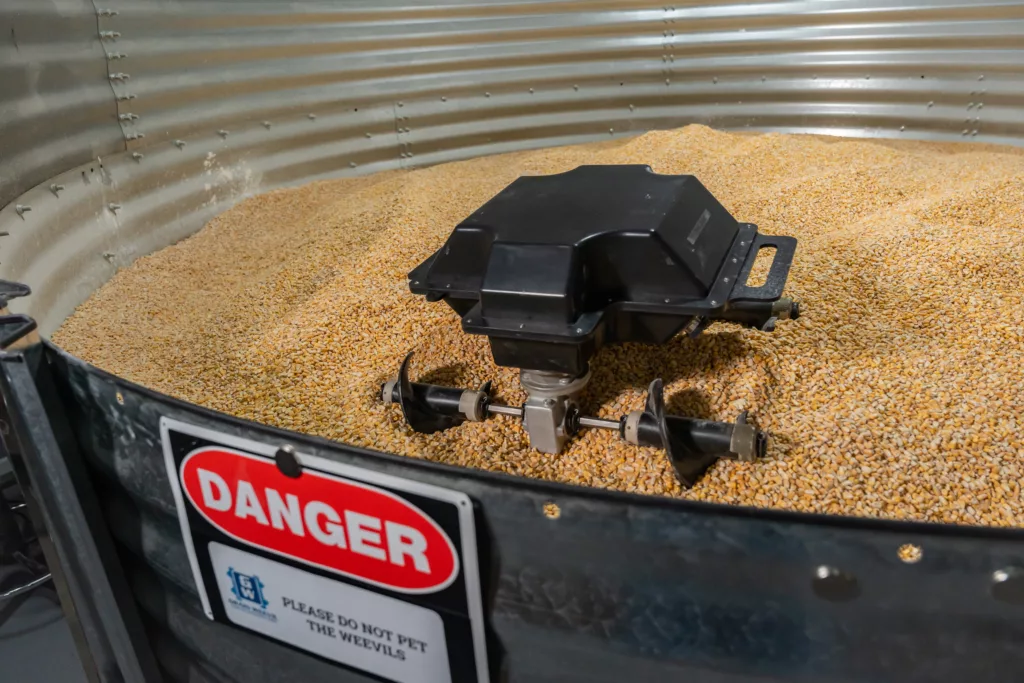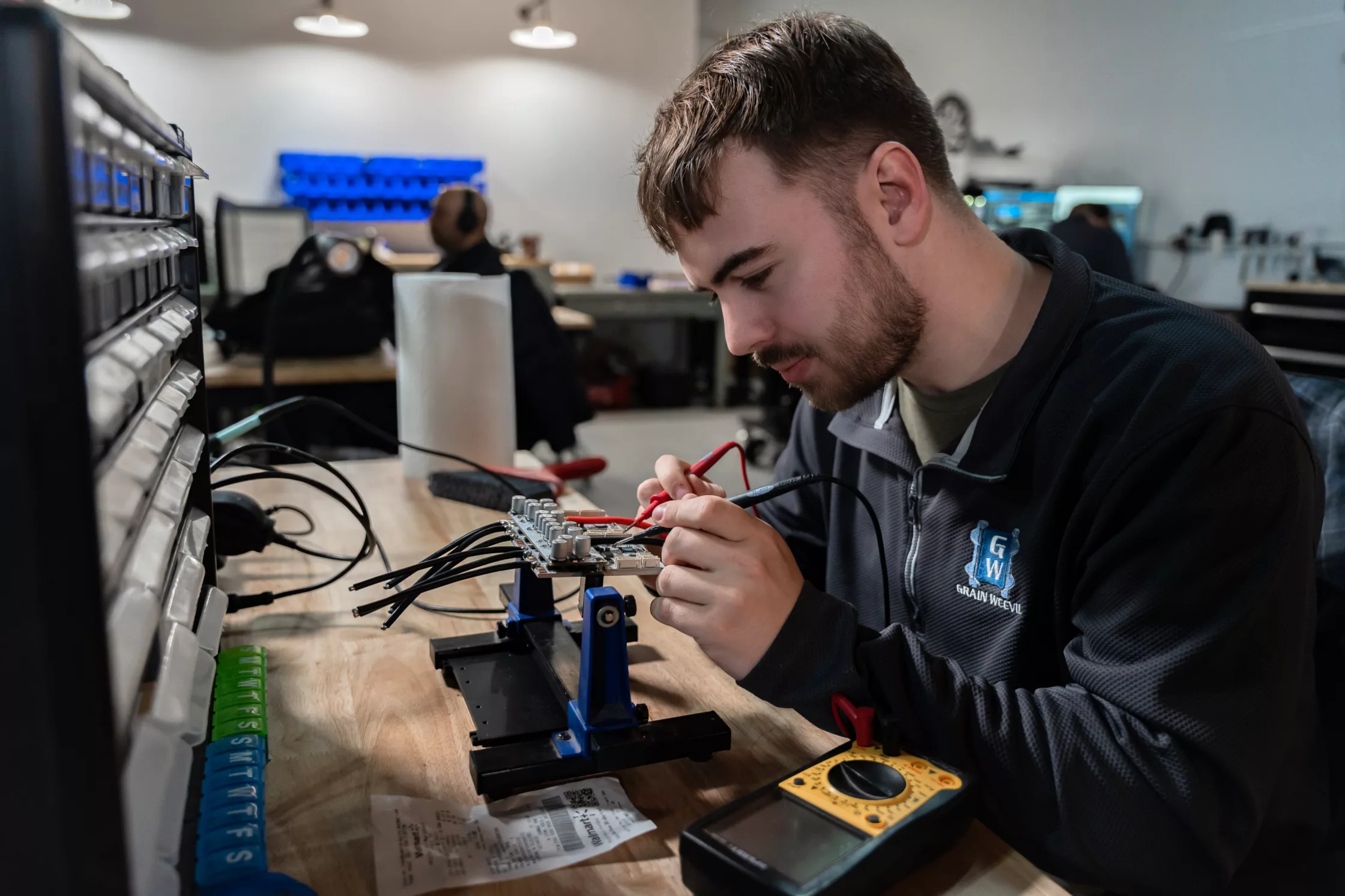Each year, dozens of American farmers are injured or killed after they climb into a grain bin.
A father-son duo from Aurora founded their one-of-a-kind company with one mission: No more boots in that grain.
Chad Johnson and son Ben Johnson have created a robot, the Grain Weevil, meant to do most of the necessary – and oft-dangerous – tasks that farmers do inside their bins.
The pair started developing their robot in 2020, after a farmer friend asked them to build a robot so the farmer would never have to go inside a bin again.
There’s ample reason to want to stay out of grain bins, the large metal cylindrical structures many farmers use to keep harvested grain dry and free of insects.
Each year, workers are injured or killed after becoming trapped, suffocating or having a heart attack. The job is so dangerous that there’s a designated Grain Bin Safety Week each February.
The Grain Weevil, a potential solution to some of this danger, is now winning acclaim as it undergoes safety trials in four states and draws closer to a release date.

The company was recently named the 2022 NBDC Innovation Business of the Year.
If certified, the Grain Weevil will become the only grain bin safety robot of its kind commercially available in the world. It’s already something else: The centerpiece of a years-long labor of love for one robot-loving Nebraska family.
An Early Passion For Robots
Ben Johnson took to robotics early, entering robotics competitions while still in grade school. When he joined the high school robotics team, his dad Chad Johnson was his coach.
“I dragged him to the state fair and made him do demonstrations because it’s just a really cool way to try to give him skills to be able to do something that would be fun,” Chad Johnson said. “Then all of a sudden the projects turned into a real business.”
In high school, Ben Johnson got into designing printed circuit boards and doing wiring to create custom robots for several small businesses.
He built a remote-controlled prototype for a dump truck lift system. He built a dynamic display for a hunting company. He built a “follow bot,” which selected a color of a tour guide’s shirt, then followed the guide for virtual video tours.

He enrolled at the University of Nebraska at Omaha, where he studied electrical engineering. He continued to work on the follow-bot. That’s when a friend of the family, a farmer, approached father and son with a request: Can you build me a robot that would keep myself and my kids outside of grain bins?
The Johnsons had no history in agriculture and were unaware of the day-to-day dangers inside grain bins. After doing some research, they accepted the challenge, deciding to build a prototype.
“We still didn’t even think of it as a real business at that point,” Ben Johnson said. “We just wanted to help our friend.”
A Problem Worth Solving
Farmers do a variety of tasks inside a grain bin. Because a layer of crust appears at the top, someone must manually break it up. To keep a consistent airflow, someone must level the grain, which can require hours of shoveling.
When a grain bin is emptied, the grain is pulled toward the center by an auger. But often someone must be inside, scooping the grain off the bin’s walls.
The Johnsons measured the air temperature inside a bin: 120 degrees Fahrenheit.
“There is no airflow in there,” Ben Johnson said. “If you’re working in there, it’s stagnant, the sweat pools up on your arms. It’s dusty and if you don’t wear a respirator you get terrible lung problems later in life.”
The combination of blistering heat, grain above one’s head and an auger moving below for hours on end is a recipe for disaster, he said.
In 2022, at least 29 grain entrapments were reported, 11 resulting in death, according to Nationwide Insurance Company. In the last decade, more than 300 entrapments have been disclosed, along with an estimated 30% that went unreported.

The Turning Point
Things started moving quickly after the Johnsons developed their first prototype.
They got their first model to work on a Saturday morning in 2020. By Monday they had a patent submitted. On Tuesday, a local corn growers’ group sponsored a community showing of the movie “Silo.”
Based on a true story, “Silo” is a 2019 thriller that follows a community’s efforts to save a child trapped in a grain bin.
The Johnsons brought a clip of their robot to the screening. They showed community members the machine that may have prevented the accident depicted in the movie. They were bombarded with questions and comments about the Grain Weevil from farmers attending the screening.
Someone posted their clip to Twitter. The Johnsons received hundreds of direct messages. They realized they had a product that could make an impact.
The father-and-son team had experience making robots out of car parts and whatever materials they could find – at one point Ben made a robot called “stuff we found at Ace Hardware” for a competition. But applying this knowledge to an autonomous robot that drove in a grain bin proved difficult.
The prototype showed the concept was possible. But this original Grain Weevil could drive for only 30 seconds.
Whenever Ben came home from college, the father and son worked in the garage. They addressed issue after issue. They tweaked how the robot operated again and again. They settled on a new battery, one that didn’t exist a few years ago. They built 10 different models of the Grain Weevil.
“That’s what that transition phase has been for us,” Chad Johnson said. “Get that robot ready to actually be able to perform on the farm, so it’s going to be easy to use and reliable and all of that. It’s been a fun process.”
Ben Johnson and his friend Zane Zents began working for Grain Weevil full time just after graduating college in May 2021. Chad Johnson followed suit in January 2022, quitting his previous full-time job.
Alesa Johnson, Chad’s wife and Ben’s mom, also works for the company as the grant manager.
“If you’re a nerd and a dad, it’s pretty much every dad’s dream to build robots with your kid,” Chad Johnson said. “I feel extremely lucky that we have a relationship that we get to work together, have fun and really make a difference.”
What’s Next
Today, the Grain Weevil has amassed over 80 million views on social media, the family says.
Farmers are constantly asking: How soon can I buy one?
Farmers have also played a big role in the robot’s design. The inventors collected data from hundreds of farmers to understand the needs for different farms and different bins.
“I would like to thank every farmer that’s worked with us,” Chad Johnson said. “They’ve made an impact on where we’ve gone, and what we’re doing because their ideas have been implemented in our machine.”
Currently, the company is working on safety certification. Grain bins are hazardous locations, as grain dust suspended in the air can explode. The Grain Weevil must be thoroughly tested to make sure it doesn’t produce extreme heat or sparks.
The safety certification is the company’s biggest hurdle prior to release. They hope to have the Grain Weevil soft-launched by this fall, with a wider release planned for next year.
The current Grain Weevil can do most of the tasks farmers previously needed to do inside a bin, the inventors say. But not yet every task. It can’t sweep the floor, for example, which means human entry is still necessary. The company leaders hope to reach their ultimate goal – no boots inside the bin – in the years ahead.
“That’s the long-term goal, having automated machines that can do the work that no human should,” Chad Johnson said. “That’s our robot.”
This story was originally published by Silicon Prairie News, FFP’s sister news outlet devoted to all things related to Nebraska startups and small businesses.


